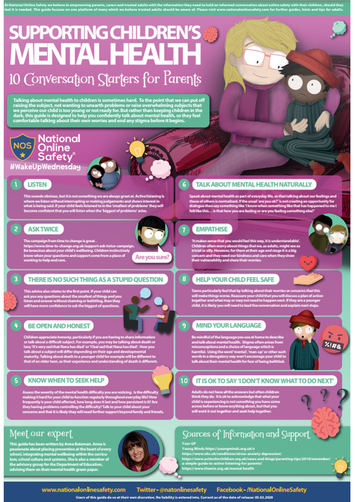Mental Health and Well-being
Supporting Mental Health & Wellbeing at St Margaret's
At St Margaret's Church of England Primary School our aim is to care for and develop the whole child educationally, emotionally, spiritually, morally and physically. As well as caring for their education we also care for their mental health and wellbeing and feel that it is essential to provide children with information to enable them to make life long, well informed decisions about their diet and health.
We aim to promote positive mental health and wellbeing of every member of our school community and recognise how important mental health and wellbeing is to our lives, as is physical health. We recognise that children’s mental health and overall wellbeing can affect their learning and achievement.
A key aspect of our role in school is to ensure that children are able to manage times of change and stress, and that they are supported to reach their potential or access help when they need it. We also have a role to ensure that children learn about what they can do to maintain positive mental health, what can affect their mental health, how they can help reduce the stigma surrounding mental health issues, and where they can go if they need help and support.
Positive wellbeing is promoted through the curriculum and all school activities. Through a carefully planned approach to PSHE our pupils are helped to acquire the knowledge and develop the skills and understanding they need to lead confident, healthy, independent lives, and to become resilient, informed and responsible citizens.
What do we do at St. Margaret's to support emotional well-being and mental health?
- St Margaret's Church of England Primary School is committed to creating a happy, caring and supportive environment. As well as a learning environment, the school ensures there is a positive, supportive and inclusive ethos where children can thrive and achieve their personal best.
- Personal, Social and Health Education (PSHE) is a central to the curriculum across the whole school. PSHE assists pupils to cope with the changes at puberty, introduces them to a wider world, manage transitions and enables them to make an active contribution to their communities. The concepts covered in PSHE include identity, managing feelings and emotions, relationships, change, resilience and being healthy, which includes physical, emotional and social well-being. You can find out more about our PSHE curriculum by visiting our PSHE page
- St Margaret's Church of England Primary School offers Nurture Provision. Children who experience domestic violence, bereavement, anxiety and any other life experiences that may affect their emotional well-being are identified and supported in regular 1:1 or small group nurture support. The school supports the child in their specific needs, meaning the pupil is at the heart of the school focus and their learning is understood developmentally.
- Within the National Curriculum, every child has a minimum of two hours of physical education each week.
- We promote healthy eating throughout the school. We look at healthy and balanced diets as part of both our PSHE and our science curricula as well as encouraging children to try a range of foods. We also ensure we offer balanced meals at lunchtime and encourage children to have healthy lunchboxes and healthy school lunches. v
- We are looking to include World Mental Health Day and Mental Health Awareness Week in the school calendar and plan activities for the whole school community.
- As a school, we have and continue to access outside help and support for pupils when required. A list of examples of where we can seek support can be found below.
Key adults
There are key adults in school linked to supporting the children with their mental health and well-being beyond the classroom. Should you be concerned about your child, please always contact your child's class teacher in the first instance. Other staff who may be able to support are identified below:
Senior Mental Health Lead: Mrs Stephanie Newland
SENCO: Mrs Anika Allen
Mental Health First Aider: Mrs Sharon Dare
In school interventions
In school, we run some interventions ourselves to support pupils. These include:
- Think Good, Feel Good
- Find Your Superpower
- Find Your Voice
- Sensory time
- Bereavement Box
- Speech Bubbles
Referrals
When it is appropriate to do so, we can support pupils by making referrals to outside agencies. We would discuss any referral with parents/carers before it went ahead and would discuss all the possible option. Below is a list of agencies we may refer to with links to websites for more information.
- Wilderness Foundation - https://wildernessfoundation.org.uk/
- Kids Inspire - https://www.kidsinspire.org.uk/
- Affinity - https://essexfamilywellbeing.co.uk/services/affinity-programme/
- CAHMS - https://www.nelft.nhs.uk/set-camhs/
Other sources of information you may like to access
- Young minds - https://www.youngminds.org.uk/
- Mind - https://www.mind.org.uk/
- Headspace - https://www.headspace.com/
- SEND Essex - https://send.essex.gov.uk/health-and-wellbeing/health-conditions/mental-health
- NSPCC - https://learning.nspcc.org.uk/child-health-development/child-mental-health
- NHS -https://www.betterliveshealthyfuturesbw.nhs.uk/learning_resource/mental-health-5-11/
- Every mind matters - https://www.nhs.uk/every-mind-matters/supporting-others/childrens-mental-health/#signs-child-struggling
- Active Essex - https://www.activeessex.org/children-young-people/childrens-mental-health/
- Speak to your GP
Starting a conversation with your child
Below are some examples of mental health conversation starters which you may wish to use with your child:

The best thing you can do is listen to your child and have open conversations with them. If you need any help or guidance, please don't hesitate to come and speak to us.
